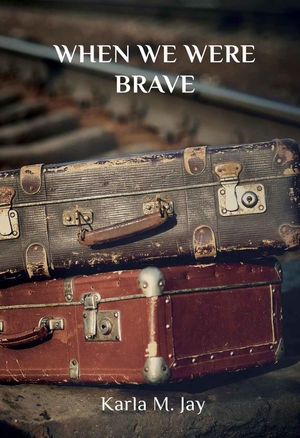
The stories of World War II often focus on battlefield heroics and the history-shaping decisions made by famous leaders. However, scaling this global conflict down to a more intimate level can also be immensely valuable, which is precisely what author Karla M. Jay has done in her new work of historical fiction, When We Were Brave.
Three very different storylines grow and artfully wind together in this sometimes harrowing read: a recently emigrated family sent back to Germany, an SS officer wrestling with a crippling crisis of faith, and a young Jewish boy just beginning to understand the cruelty of the world. There doesn’t initially appear to be a connection between the three tales, aside from their connection to Germany and the events transpiring there, but Jay does a remarkable job of weaving these richly developed plots into a gripping tapestry.
The story of Wilhelm Falk is one of resistance in the face of incalculable evil – as a high-ranking member of the SS, he is able to send out letters to the world, explaining the true intentions of the Nazi “work camps.” When that doesn’t work, he allows himself to be captured, in the hopes of being brought to America. Izaak Tauber is a narrator witnessing the terrible reality of Hitler’s roundup through the eyes of a child. Similar to some of Faulkner’s characters, Izaak provides an innocent perspective, an innocence that readers see disappear as the darkness of a work camp envelops him. The Muller family is the heartbreaking third corner of this tragic triangle, and as Herbert watches his father Otto be taken away by FBI agents, it dramatically changes his direction in life.
These three disparate storylines gradually coalesce, and along the way, Jay demonstrates a mastery of emotion and landscape. The scenes are visceral, the dialogue is sharp and believable, and the narrators are immediately engrossing. There is a perpetual tone of suspense, although it isn’t clear what the collision of these three worlds will generate. There is no indication of a happy ending, but Jay also peppers in moments of lightheartedness and hope among the darker segments.
For history enthusiasts, the level of detail, cultural accuracy, and research feels immersive, without being overly expositional. The world of the past spills out naturally, drawing readers into the relationships between these characters, which is where the greater lessons of the book live. While World War II is often seen as the greatest moral challenge of modern times, Jay focuses on the individual choices and views of select groups, thereby humanizing these victims and heroes beyond simple statistics in a history book. Nor does she overembellish their stories to make them larger than life.
There are a few moments where the pace is uneven, but Jay chooses her words carefully, and on the whole the novel is a vivid portrait of a time and place with characters who are immediately recognizable. Despite the fact that these events took place 70 years ago, this novel is imbued with a disturbing relevance, given recent developments in the news. As a complete and compelling work of fiction, When We Were Brave may not always be an easy read, but it is an essential one.
Book Links
STAR RATING
Design
Content
Editing
Get an Editorial Review | Get Amazon Sales & Reviews | Get Edited | Get Beta Readers | Enter the SPR Book Awards | Other Marketing Services























Leave A Comment